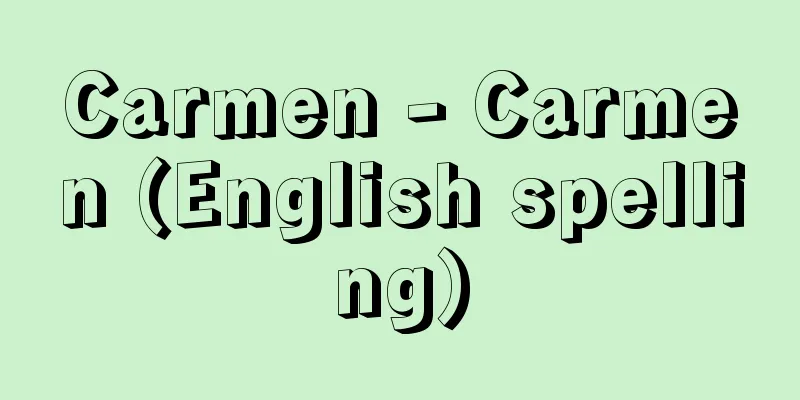Carmen - Carmen (English spelling)

|
A novella by the French author Mérimée. Published in 1845. Don José, a corporal of the guard, falls for Carmen, a girl working in a tobacco factory in Seville, and with her help, he throws himself into the ranks of smugglers. Although he ends up fighting her lover and killing him, the free-spirited Torso Carmen soon falls in love with the bullfighter Lucas. When José urges her to start a new life in America, she harshly rejects him, and as if she had expected it, she dies by José's sword. She had believed what her fortune-teller had told her. The above is the content of José's confession in the third chapter. Chapters 1 and 2 respectively tell the story of the encounter between the narrator and Carmen, and between the narrator and José, and the final chapter is devoted to a discussion of gypsies that is unrelated to the plot. It is a typical example of the framed stories that Mérimée loved. Merimee depicts the uncontrollable, runaway passion, the actions of the outlaws, which can only be described as a struggle against fate, and their inevitable catastrophe with a restrained brush, adding his usual touches of exoticism and pedantry. Combined with the skillful structure, this is worthy of being called the author's masterpiece. [Akio Tominaga] OperaGeorges Bizet composed the work based on a libretto by Meillac and Haléby. It premiered at the Opéra Comique in Paris in 1875. It was later adapted into a full opera (and premiered in Vienna in the same year). The music incorporates a large amount of Spanish folk music in keeping with the original story, giving it a strong regional flavor. Carmen's "Habanera" is a good example of this, and in that it attempted to inject the vitality of folk music into art music, and succeeded in doing so, this work can be said to be on par with Mussorgsky's "Boris Godunov." In keeping with the customs of the time, the arias and duets are each in the form of independent "number operas," inheriting the traditional techniques of French opera, but the inventive melody, clear orchestration, and vivid dramatic effects give the uniqueness that only a masterpiece can have. It premiered in Japan in 1919 (Taisho 8) by the Russian Opera Company. [Yukio Miyake] "Carmen" translated by Katsuo Sugi (Iwanami Bunko) Source: Shogakukan Encyclopedia Nipponica About Encyclopedia Nipponica Information | Legend |
|
フランスの作家メリメの中編小説。1845年刊。衛兵伍長(ごちょう)ドン・ホセは、セビーリャの煙草(たばこ)工場の女工カルメンの魅力のとりことなり、彼女の手引きで密輸業者の群れに身を投ずる。彼女の情夫と渡り合って相手を殺すはめにまで落ちたものの、奔放なトルソ人カルメンは、まもなく闘牛士ルカスに心を移す。アメリカで新生活を始めようと迫るホセに手ひどい拒絶を投げつけた彼女は、予期していたかのようにホセの刃(やいば)にかかって死ぬ。占いの告げるところを彼女は信じていたのである。以上は第3章のホセの懺悔(ざんげ)話の内容で、第1章および第2章は、それぞれ話者とカルメン、話者とホセの邂逅(かいこう)の次第を物語り、最終章は筋と関係のないジプシー談義に終始する。メリメの愛用した額縁つき物語の典型である。抑えようもなく暴走する情熱、運命との抗争としかいいようのないアウトローたちの行動とその必然的破局を、例によって異国趣味とペダントリーの彩りを添えつつ、抑制のきいた筆でメリメは描破する。構成の巧みさと相まって、作者の代表作とするに足りよう。 [冨永明夫] オペラジョルジュ・ビゼーが、メイヤックとアレビーの台本により作曲。1875年、パリのオペラ・コミック座初演。のち正歌劇に改作(同年ウィーン初演)。音楽は原作の内容に即してスペイン民謡を大幅に取り入れ、実に地方色の強いものとなっている。カルメンの歌う「ハバネラ」などはそのよい例であり、民族音楽のもつ活力を芸術音楽に注ぎ込もうと試み、それに成功した点で、この作品はムソルグスキーの『ボリス・ゴドゥノフ』と双璧(そうへき)をなしているといえよう。当時の慣習に従って、アリアやデュエットなどがそれぞれ独立した「番号オペラ」の形式をとり、フランス・オペラの伝統的な手法を受け継いではいるが、創意あふれる旋律、明晰(めいせき)なオーケストレーション、そして鮮やかな劇的効果には、名曲のみがもつ一回性が感じられる。日本初演は1919年(大正8)ロシア歌劇団による。 [三宅幸夫] 『杉捷夫訳『カルメン』(岩波文庫)』 出典 小学館 日本大百科全書(ニッポニカ)日本大百科全書(ニッポニカ)について 情報 | 凡例 |
<<: Carmen Comes Home - Carmen Comes Home
>>: Carmelites - Ordo Carmelitarum (Latin)
Recommend
International Air Traffic Association
…It is a private organization established in 1945...
Cavaignac, E.
…He was a politician who led the revolutionary re...
Abandonment of Aunt - Obasute
...The title of a Noh piece. Depending on the sch...
Illness - illness
In medicine, illness is often defined as "di...
Government association - Goyoukumiai
A labor union that is controlled or operated by, ...
hinge
...It is often a target for mineral exploration. ...
Moe, J.
…After nearly a century of rampant educationalism...
Female Goddess of Thunder - Onna Narukami
Kabuki kyogen. One act. Historical piece. Original...
Cones - Kyukarui
A group of gymnosperms, also known as conifers. Th...
Kiyoshito - Kiyoshito
Year of death: 7/11/753 (8/14/753) Year of birth: ...
Iron-breaking Kumazo - Iron-breaking Kumazo
… On the other hand, the influence of Kabuki on s...
Limpopo [river] - Limpopo
A large river in southern Africa. It originates ne...
FTA - FTA
Abbreviation for Free Trade Agreement. It aims to ...
Manus Island (English spelling)
It is the main island of the Admiralty Islands, lo...
Kutev, F.
...These instruments show Turkish influence, and ...
![Kasuga [city] - Kasuga](/upload/images/67cb33b34386a.webp)








